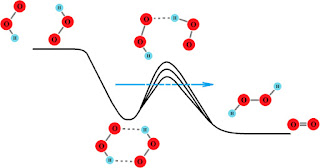Seth Olsen brought to my attention an interesting paper Quantum tunneling affects engine performance.
The authors consider a specific chemical reaction that occurs in diesel engines. The rate of this hydrogen abstraction reaction, shown below, is modified by quantum tunneling below the energy barrier associated with the transition state.
This reaction is one of hundreds happening in an engine but it turns out the ignition time of the diesel engine is quite sensitive to the rate at which this specific reaction occurs. The authors estimate the ignition time could vary by up to ten per cent due to tunneling.
I don't know anything about diesel engines.
But I do see a little bit of a falsification problem with the papers claim. The reaction rate also varies with small changes in the barrier height [see Table 1]. The latter is difficult to calculate accurately. One way to separate out the effect of tunneling is to do an isotope substitution. Deuterium will have less tunneling than hydrogen. But, it also has a different barrier due to the zero point correction. Similar issues come up in trying to establish the contribution of tunneling to proton transfer reactions in enzymes.
Subscribe to:
Post Comments (Atom)
A golden age for precision observational cosmology
Yin-Zhe Ma gave a nice physics colloquium at UQ last week, A Golden Age for Cosmology I learnt a lot. Too often, colloquia are too speciali...

-
This week Nobel Prizes will be announced. I have not done predictions since 2020 . This is a fun exercise. It is also good to reflect on w...
-
Is it something to do with breakdown of the Born-Oppenheimer approximation? In molecular spectroscopy you occasionally hear this term thro...
-
Nitrogen fluoride (NF) seems like a very simple molecule and you would think it would very well understood, particularly as it is small enou...




Yes, deuterium isotope is important for judgement of some quantum effect, but the key point is that the movement of deuterium is certainly slow than that of hydrogen because of its heavy weight, and this is classical mechanism. If you observe the slowing down for the molecule with deuterium, how do you know it is a quantum effect? May be it is just a isotopic effect.
ReplyDeleteGreat post about quantum diesel engines!
ReplyDeleteVery true! Good one about quantum diesel engines!
ReplyDelete